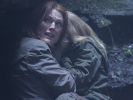Eye For Film >> Movies >> Shelter (2010) Film Review
In the early years of the last century there was a mass cultural obsession with the occult. It was seen by many critics at the time as a backlash against the dominance of a scientific mindset from which many ordinary people felt excluded - an attempt to reclaim a more personal power relationship with the world. Ironic, then, that this story should have its roots in 1918, because it seems in many ways like a mirror of that phenomenon. It opens like a psychological thriller as a psychiatrist encounters an unusual patient, but the soundtrack and direction are so heavy-handed that viewers won't be under any illusions about it staying that way.
Successful partnerships in directing are a rare thing. Usually, when they work, it's because one partner is concentrating on the visual side of things whilst the other concentrates on the actors. In this case, nobody seems to be paying much attention to the actors at all, whilst the visual tone is strangely polarised, as if one director really believed he was filming a thriller (with some beautiful desaturated landscapes) whilst the other lurched straight off into occult horror territory. In its way, this is the perfect framework for the story of a young man with (so it first appears) multiple personality syndrome, but it leaves the film feeling fractured, ill at ease with itself. Like most genuine mental illnesses, its glamour is quickly lost once we get close to it.

The patient at the heart of this story is played by Jonathan Rhys Myers, which is unfortunate, since he can barely summon enough personality for one character. His contribution to the film is largely ornamental; when he has to play vulnerable, he works well enough, but when he needs to be menacing the best the directors can do is to put him in dark clothes and give us endless shots of him walking along staring fixedly, which becomes funny after a while. Fortunately the film is carried by Julianne Moore, in the bigger and meatier role, and she's superb as always. One does have to wonder what she thinks she's doing in a film like this, but then, few roles today give a woman as much to work with, and she really makes the most of what she has here. She also benefits from being shot largely without make-up, giving her the chance to be much more expressive than most actresses are permitted to be, and her rough edges make her seem more real in a film that badly needs that grounding.
Fans of Moore will probably find this film worthwhile for her presence alone. It will also have significant appeal for devotees of occult classics like The Omen and The Exorcist, evoking a similar mood and having lots of fun with slightly old fashioned horror tropes like backwoods witches. It can't really be considered a strong entry in this canon, however, as it doesn't share their meticulous plotting. The screenwriter's approach to story seems to have prioritised quantity over quality. It's an attempt to dazzle the audience, throwing in so many twists that it might be hoped we don't notice how predictable most of them are or how little sense they make.
The film's moral message - so important in this type of horror - is similarly confused. In order to critique reliance on reason one really needs to use a reasoned argument. Taking a strong pro-Christian stance in places (more so than many Christians will find comfortable, especially as it relates to children), elsewhere the film presents a view of a starkly amoral world. Perhaps this is meant to make us wary of both these extremes, but telling the story this way feels unbalanced, as we're then expected to focus on a single villain whilst hideous things done on the sidelines are simply ignored. Like split ends in hair, these moral loose ends work their way back to the root, breaking down the whole structure.
One might also have thought that, following the criticism over Blindness, Moore might have been wary of involving herself with a film with such a hamfisted approach to disability issues. Not only is in unrelentingly bleak in its approach to mental health, it's outright stupid in its attitude to wheelchair use. This isn't so much a moral issue as a practical one - it means that anybody familiar with such things will find certain key scenes laughable, which a film that relies so much on building up an atmosphere of dread cannot afford.
This is one of those films whose good points serve to make it more of a disappointment. With more discipline and, well, more thought, it might have been a great piece of work. As it is, it's an adequate Saturday night scare, but little more.
Reviewed on: 05 Apr 2010



















